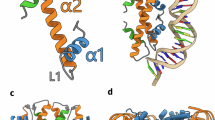Play all audios:

ABSTRACT THE genome of eukaryotes is organised in nucleoprotein fibres formed by the interaction of the DNA with small basic proteins, the histones, and by specific interactions between
certain histones1. To gain more insight into the molecular organisation of chromosomes it is necessary to determine in detail the complexity and variability of the histones. The chromosomes
of eukaryotes contain five major types of histones. One of these, the very lysine-rich H1, consists of a small number of poly-peptides which differ slightly in primary structure and which
are present in different relative amounts in different tissues2. The other four histones, which are involved in histone–histone interactions, were considered homogeneous and invariable until
it became possible to resolve H2a, H2b and H3 into variants which exhibit tissue-specific variation by polyacrylamide gel electrophoresis in presence of non-ionic detergents3 (Fig. 1). We
report here on the primary structure of the variants of mammalian histones 2a, 2b and 3. Access through your institution Buy or subscribe This is a preview of subscription content, access
via your institution ACCESS OPTIONS Access through your institution Subscribe to this journal Receive 51 print issues and online access $199.00 per year only $3.90 per issue Learn more Buy
this article * Purchase on SpringerLink * Instant access to full article PDF Buy now Prices may be subject to local taxes which are calculated during checkout ADDITIONAL ACCESS OPTIONS: *
Log in * Learn about institutional subscriptions * Read our FAQs * Contact customer support SIMILAR CONTENT BEING VIEWED BY OTHERS HISTONES AND HISTONE VARIANT FAMILIES IN PROKARYOTES
Article Open access 11 September 2024 MULTIFUNCTIONAL HISTONE VARIANTS IN GENOME FUNCTION Article 13 August 2024 THE ROLES OF HISTONE VARIANTS IN FINE-TUNING CHROMATIN ORGANIZATION AND
FUNCTION Article 14 July 2020 REFERENCES * Elgin, S. C. R. & Weintraub, H. _A. Rev. Biochem._ 44, 725–774 (1975). Article CAS Google Scholar * Kinkade, J. M., Jr & Cole, R. D. _J.
biol. Chem._ 241, 5790–5797 and 5798–5805 (1966); 244, 3375–3386 (1969). PubMed CAS Google Scholar * Zweidler, A. in _Methods in Chromosomal Protein Research_ (eds Stein, G. & Stein,
S.) (Academic, New York, in the press). * Johns, E. W. _Biochem. J._ 92, 55–59 (1964); _ibid._ 105, 611–614 (1967). Article CAS Google Scholar * Franklin, S. G. & Zweidler, A. _J.
Cell Biol._ 67, 122a (1975). Google Scholar * Felix, A. M. & Jimenez, M. H. _J. Chromatog._ 89, 361–364 (1974). Article CAS Google Scholar * Mendez, E. & Lai, C. Y. _Analyt.
Biochem._ 65, 281–292 (1975). Article CAS Google Scholar * Yeoman, C. E. _et al._ _J. biol. Chem._ 247, 6018–6023 (1972). PubMed CAS Google Scholar * Iwai, K., Hayashi, H. &
Ishikawa, K. _J. Biochem._, 72, 357–367 (1972). Article CAS Google Scholar * DeLange, R. J., Hooper, J. R. & Smith, E. L. _J. biol. Chem._ 248, 3261–3274 (1973). PubMed CAS Google
Scholar * Laine, B., Sautiere, P. & Biserte, G. _Biochemistry_ 15, 1640–1645 (1976). Article CAS Google Scholar * Ishikawa, K., Hayashi, H. & Iwai, K. _J. Biochem._ 72, 299–326
(1972). Article CAS Google Scholar * Patthy, L. & Smith, E. L. _J. biol. Chem._ 250, 1919–1920 (1975). PubMed CAS Google Scholar * Brandt, W. F., Strickland, W. N. & Von Holt,
C. _FEBS Lett._ 40, 349–352 (1974). Article CAS Google Scholar * Hooper, J. A., Smith, E. L., Sommer, K. R. & Chalkley, R. _J. biol. Chem._ 248, 3275–3279 (1973). PubMed CAS Google
Scholar * Brandt, W. F. thesis, Univ. Cape Town (1972). * Patthy, L., Smith, E. L. & Johnson, L. _J. biol. Chem._ 248, 6834–6840 (1973). PubMed CAS Google Scholar * Dayhoff, M. D.
_Atlas of Protein Sequence and Structure_, 4 (National Biomedical Research Foundation, Maryland, 1969). * Scheraga, H. A. in _Current Topics in Biochemistry_ (eds Anfinsen, C. B. &
Schechter, A. N.) 1–42 (Academic, New York, 1974). Google Scholar * Lewis, P. N. & Bradbury, E. M. _Biochem. biophys. Acta_ 336, 153–164 (1974). CAS Google Scholar * Hamand, K. &
Iwai, K. _J. Biochem._ 79, 125–129 (1976). Article Google Scholar * Zweidler, A. _Arch. Genetik_ (in the press). * Zweidler, A. in _Organisation and Expression of Chromosomes_ (eds
Allfrey, V. G., Bautz, E. K. F., McCarthy, B. J., Schimke, R. T. & Tissieres, A.) 187–196 (Berlin: Dahlem Konferenzen, 1976). Google Scholar * Borun, T. W., Gabrielli, F., Ajiro, K.,
Zweidler, A. & Baglioni, C. _Cell_ 4, 59–67 (1975). Article CAS Google Scholar * Borun, T. W., Ajiro, K., Zweidler, A., Dolby, T. W. & Stephens, R. E. _J. biol. Chem._ 252,
173–180 (1976). Google Scholar * Cohen, L. H., Newrock, K. M. & Zweidler, A. _Science_ 190, 994–997 (1975). Article ADS CAS Google Scholar * Goodwin, G. H., Sanders, C. & Johns,
E. W. _Eur. J. Biochem._ 38, 14–19 (1973). Article CAS Google Scholar * Bradbury, E. M., Hjelm, R. P. & Baldwin, J. P., in _Organization and Expression of Chromosomes_ (eds Allfrey,
V. G., Bautz, E. K. F., McCarthy, B. J., Schimke, R. T. & Tissieres, A.) 223–238 (Dahlem Konferenzen, Berlin, 1976). Google Scholar Download references AUTHOR INFORMATION AUTHORS AND
AFFILIATIONS * The Institute for Cancer Research, Fox Chase Cancer Center, 7701 Burholme Avenue, Philadelphia, Pennsylvania, 19111 SAMUEL G. FRANKLIN & ALFRED ZWEIDLER Authors * SAMUEL
G. FRANKLIN View author publications You can also search for this author inPubMed Google Scholar * ALFRED ZWEIDLER View author publications You can also search for this author inPubMed
Google Scholar RIGHTS AND PERMISSIONS Reprints and permissions ABOUT THIS ARTICLE CITE THIS ARTICLE FRANKLIN, S., ZWEIDLER, A. Non-allelic variants of histones 2a, 2b and 3 in mammals.
_Nature_ 266, 273–275 (1977). https://doi.org/10.1038/266273a0 Download citation * Received: 08 November 1976 * Accepted: 18 January 1977 * Published: 01 March 1977 * Issue Date: 17 March
1977 * DOI: https://doi.org/10.1038/266273a0 SHARE THIS ARTICLE Anyone you share the following link with will be able to read this content: Get shareable link Sorry, a shareable link is not
currently available for this article. Copy to clipboard Provided by the Springer Nature SharedIt content-sharing initiative
